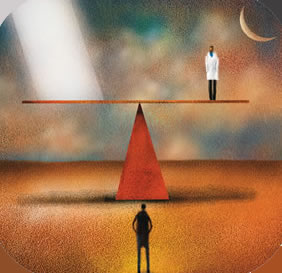Paths to Healing
U-M's multicultural health initiatives foster understanding to help patients get the care they need
There is an awareness that patients come to hospitals as a whole person and that they bring with them not only their beliefs and customs that are culturally related, but also their social and religious backgrounds.
-Gloria Edwards, director of Multicultural Health
Darrin Patterson was 17 when his left hand started to hurt. A lump swelled over his wrist, and his mom called for a doctor's appointment. It looked like a simple cyst. But a week later, a biopsy revealed the cause of his pain to be synovial sarcoma, a rare form of cancer that affects the soft tissue surrounding joints.
After hearing the news, Patterson prayed. He felt a sense of peace settle over him. And then one day while he was waiting to meet with doctors at the University of Michigan Taubman Health Center for a second opinion, his grandmother made a suggestion.
"'If you really believe God has healed you,' she said, 'I wouldn't get anything. I wouldn't get chemo, I wouldn't get radiation, I wouldn't get anything,'" Patterson recalled. "And I said to her, 'You know, you're right.' And from that moment on, I didn't get anything."
Patterson put his faith in God and waited to be cured. But 15 years later, the lump remained, and the pain still nagged. Now a husband and father -- and an employee in the University of Michigan Rogel Cancer Center's main infusion area -- Patterson decided to consider treatment.
Three surgeries and two years later, Patterson is cancer free. For some, like Patterson, the first step to getting the cancer treatment they need is reconciling conflicting religious or cultural beliefs. As medical care has evolved, doctors and other health-care practitioners have learned that being sensitive to these beliefs is key to providing quality care.
"There is an awareness that patients come to hospitals as a whole person and that they bring with them not only their beliefs and customs that are culturally related, but also their social and religious backgrounds," said Gloria Edwards, director of Multicultural Health at Michigan Medicine. "We try to look at our patients as whole people. That's what culturally competent care is about."
What people care about most, no matter what their race or culture, is that their doctor is validating them.
--Aisha Langford, former-director of Community Outreach

Hiam Hamade coordinates the ACCESS Community Health Center's Breast and Cervical Cancer Control Program in Dearborn, Mich.
Her goal is to educate Arab-American women about their cancer risk and encourage prevention, screening and treatment.
Recently, a woman with a very large -- and almost certainly cancerous -- lump in her breast came to the ACCESS clinic. The woman told Hamade that she had put off going to the doctor because she didn't want her sons to know about it. And, when her sons found out their mother was undergoing a biopsy, they asked Hamade not to tell their mother if it was, indeed, cancer.
"They don't want me to tell her, but she has the right to know," Hamade said. "If she has to go for treatment, she needs to know. This is a challenge."
It's one of many challenges Hamade has faced during her 14 years at ACCESS. Women facing cancer diagnoses often won't go for follow-up treatment if there's a chance they may have to see a male doctor, she said.
Although it's not always possible to schedule all female patients with female physicians at U-M, Edwards said, the staff works with families to make accommodations. For example, if a patient needs to stay in the hospital, Edwards's team has worked out systems where all male health-care providers need to check in at the nurse's station before entering a patient's room where modesty is a concern.
Hamade said there's also a stigma attached to a cancer diagnosis within some parts of the community because people may fear that their disease will be passed on to their daughters. Some Arab- Americans also fear that doctors will experiment on them, rather than provide treatment.
"We have to change attitudes and beliefs," Hamade said. "Even if members of the community have been here for a long time, this is something rooted in the culture. The new generation may be different, but the new generation also won't know their own medical history because their mothers don't talk about it."

It was an early conversation with Peter Jebson, M.D., that helped Darrin Patterson take the next step toward cancer treatment. Initially, Jebson couldn't believe what he saw when he got Patterson's referral. Jebson, an associate professor of Orthopaedic Surgery who has operated on many U-M Rogel Cancer Center patients with tumors in their hands and arms, had never seen a patient who had waited so long to be treated for cancer.
"I said, 'This doesn't jibe. There's no way,'" Jebson recalled.
Patterson told Jebson about his religious beliefs, and because of that, Jebson felt comfortable revealing that he also considers himself a religious person. Jebson doesn't promote his faith -- and, in fact, wouldn't have ever mentioned it if Patterson hadn't opened up to him about his religious beliefs.
Unfortunately, Jebson said, modern health care doesn't often allow doctors to spend enough time with patients to develop deeper relationships.
"You can only have these conversations when you've really gotten to know someone,' Jebson said. "The vast majority of physicians are not comfortable speaking to patients about religious matters. We're not trained to do it, but I've learned from my patients about how to be respectful of their beliefs."
In addition to educational offerings provided by the Michigan Medicine's Cultural Competency Division, the University of Michigan Medical School also has integrated multicultural health throughout its formal curriculum.
The root of all efforts promoting cultural awareness is to foster understanding and respect, said Aisha Langford, former-director of Community Outreach for the U-M Rogel Cancer Center.
"What people care about most, no matter what their race or culture, is that their doctor is validating them and taking all of their concerns into account," she said.
And that's just what Jebson did during the conversation that left a lasting impression on Patterson.
"I just had to accept that I needed treatment, and it was humbling to do that," Patterson said. "All my beliefs came into question. Where is God? But I kept my beliefs and my faith.'
Read the Spring, 2010 issue of Thrive.
